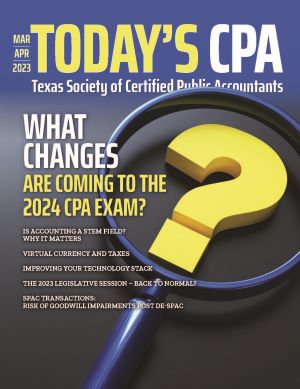The 2023 Legislative Session – Back to Normal?
By Kenneth Besserman, JD,
TXCPA Director of Government Affairs and Special Counsel
The opening days of the 2023 session of the Texas Legislature were in sharp contrast to the 2021 session. On January 10, 2023, the Capitol was filled with visitors, guests and legislators celebrating the opening day of session and the election of the Speaker of the House. Last session, the Capitol was mostly closed to visitors and celebrations were short and muted as the state and country were mired in the middle of the COVD-19 pandemic. What a difference two years makes. The Texas Legislature is back in full swing, debating the critical issues of the day and seemingly “back to normal.”
Beyond the return to normalcy, what is making the 88th session so different than past sessions is the unprecedented budget surplus that the state is holding. Comptroller Glenn Hegar, in his January 8 Biennial Revenue Estimate, told the legislature that Texas will have a budget surplus over $30 billion, meaning that in crafting the next two-year budget, the legislature will have over $30 billion in excess revenue to use for increased spending if it chooses.
FOLLOW OUR ADVOCACY EFFORTS:Legislative Action CenterTXCPA Legislative Agenda
|
All indicators and state budget watchers are of the opinion that Texas will likely have significantly more than a $30 billion surplus as more federal funds flow to Texas and as sales tax and oil and gas taxes continue to increase. Beyond the budget surplus, the state has a very large Rainy Day Fund, which will be very close to hitting the constitutional cap of $25 billion.
As Hegar mentioned at the TXCPA Advocacy Day in late January, Texas has never seen this type of budget surplus and never will again in the future. Hegar also suggested that the legislature should make some wise long-term investments in infrastructure, water, power grid reform, broadband internet access and other projects, so that Texas can continue to be an economic growth engine and provide the needed services for a continuingly rapid growing population.
In addition to a large budget surplus, there are a number of issues that the legislature and state leadership will be debating this session. Top of mind to most elected officials is how to address skyrocketing property taxes and property appraisals. State leaders, the Governor, Lt. Governor and Speaker of the House all want to lower property taxes, although the amount of property tax reduction, how much of the surplus to use and what form the reduction will take are up for debate, negotiation, horse-trading and compromise. Property tax reform will be the paramount issue of the session and will affect all other legislation the House and Senate debates.
Beyond property tax reform, there are quite a number of issues the legislature will debate that will make this session look normal compared to the pandemic session of 2021. Some of the large and controversial issues include:
- Power grid reform;
- School finance funding (as a way to address property tax reform);
- Chapter 313 economic development agreements;
- Health care funding;
- Border security funding;
- Numerous social issues;
- Gubernatorial power in declared emergencies;
- Workforce development;
- Election integrity and voting rights;
- Teacher salaries;
- School safety measures; and
- Casino gambling.
That is just the beginning. Some of these issues require new or increased state funding, so there will be a lively debate in the budget committees and on the House and Senate floor as to what are the state’s spending priorities. This is a “normal” debate during a legislative session – but with so much extra money to spend, it becomes much more difficult for legislators to say “no” when it comes to essential or needed funding and projects.
TXCPA is working very hard on our legislative priorities for 2023. Please see below. The CPA pipeline is our top priority this session. One way in which we can help the pipeline legislatively is to allow students and candidates to begin taking the CPA Exam after completion of 120 hours, rather than the current requirement of finishing 150 semester hours before testing.
By allowing students to take the Exam closer to their core accounting coursework and before students leave the accounting track for other opportunities, we hope that we can affect the pipeline and get more people licensed. Texas is a growing state and we need more CPAs to provide services to taxpayers and businesses.
With all of the pandemic-related restrictions in the Capitol lifted, dozens of major issues facing the legislature, and political and electoral posturing front and center, we are certainly “back to normal.” How all of the issues are addressed and tackled will have long-term implications on the state.
About the Author: Kenneth Besserman, JD, is TXCPA's Director of Government Relations and Special Counsel. Contact him at kbesserman@tx.cpa.






















